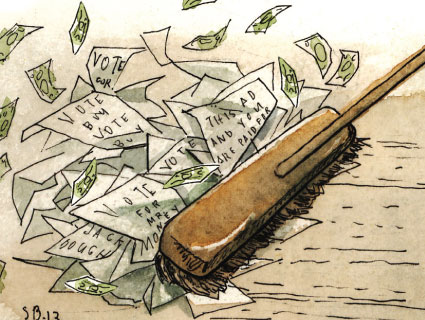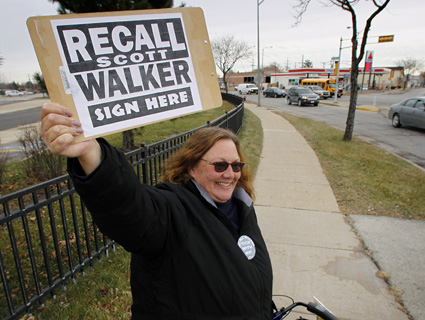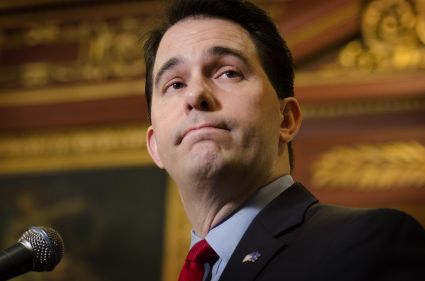Others have written much more eloquently about the recall story in Wisconsin than I ever could. Rick Perlstein, for instance, a homeboy who wrote this epic piece just before the primary election in which he made the case for why we should all care about the governor’s race:
Here’s why: the voting in Wisconsin this spring “will be the first national test of the possibility of democracy in the Citizens United era,” writes Ruth Conniff of the Madison-based magazine The Progressive, referring to the historic Supreme Court ruling that allowed unlimited spending on polticial campaigns. If conservatives succeed in breaking public unions in Wisconsin, they will try the same thing everywhere, with mind-blowing seriousness. Already by this February, Walker, taking advantage of a loophole that allows donors to recall targets to blow through the state’s $10,000 contribution cap, had raised an astonishing $12.2 million dollars; then, by April, he had added $13.2 million more. […] So, $25 per vote from reactionary out-of-state donors versus three bucks and one million petition signatures from regular old Wisconsinites: which one of them will prevail in June will tell us what American democracy will look like – if it will look like democracy at all. It’s like one of those posters I saw in Madison last year said. It quoted the Gettysburg Address: “Now we are engaged in a great civil war testing whether that nation, or any nation so conceived or so dedicated can long endure. We are met on a great battlefield of that war.” The picket sign added: “MADISON is that battlefield.”
And E.J. Dionne went right to the heart of the matter with this piece on Wednesday:
Walker is being challenged not because he pursued conservative policies but because Wisconsin has become the most glaring example of a new and genuinely alarming approach to politics on the right. It seeks to use incumbency to alter the rules and tilt the legal and electoral playing field decisively toward the interests of those in power.
It’s hard to overstate just how important this race is to progressives. The polls this week range from a dead heat to Walker leading by up to six points. We’ll keep our fingers crossed.
But in looking at the Marquette University poll just out yesterday, I couldn’t help but be somewhat surprised by this:
Voters say they feel their current governor would be better at creating jobs than his recall challenger. Half say they think Walker would do a better job, while just 43 percent pick Barrett. And Walker holds a 51 percent favorable rating and 46 percent unfavorable, while his rival is at 41 percent favorable and 46 percent unfavorable.
It’s almost unbelievable to me that voters would believe that when job creation has been the biggest issue of the campaign—and it hasn’t been good for Walker:
Much of the debate over job creation started when the federal Bureau of Labor Statistics released numbers that showed Wisconsin lost 23,900 jobs from March 2011 to March 2012, the worst performance of any state in the country. Barrett seized on the news, attacking the governor in a press conference and in an ad claiming that, under Walker, Wisconsin lost a job every hour. But Walker’s team insisted that the numbers were wrong. By the time the April figures came out last week, showing a gain of 4,500 jobs for the month, his administration had tried to build a case that the monthly estimates were unreliable.
Even though Walker is being recalled mostly because of a fight with workers and the state is dead-last in job creation, 50% of the voters think he’ll be better at job creation than the other guy? Nobody in the country has done worse!
This strikes me as yet another success of conservative talking points. I think many people have simply absorbed the oft-repeated notion that Republicans are the advocates for “job-creators” with their low taxes and deregulation and even in the face of clear evidence otherwise they can’t really see how anything else would work. And you can’t really blame them all that much. Nobody’s really telling them another story, at least not one that would make them think that Democrats would be better advocates for the “job creators.” So they default to the conventional wisdom or plain old tribalism.
Still, that’s just one question and despite everyone being understandably concerned about unemployment, people will base their votes on many factors. This race is close enough that it could go either way. Perhaps the good citizens of Wisconsin will go into the voting booth and realize that they just can’t afford another two years of Scott Walker’s mess. A handful of very wealthy plutocrats have poured a ton of money into the state for the past year betting that they won’t. It would be nice if that money turns out to have been wasted.
Heather Digby Parton is guest blogging this week while Kevin Drum is on vacation.













